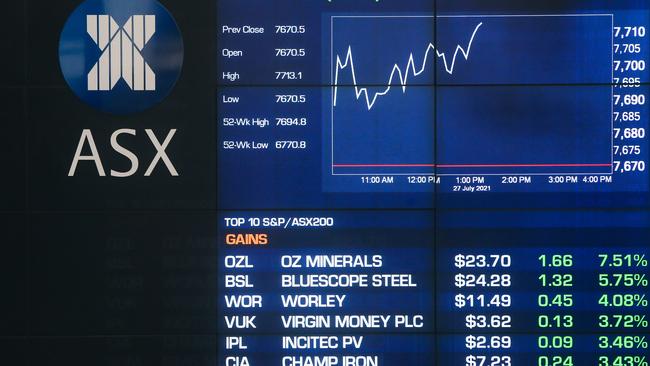Why Australia’s economy will get through this crisis

The first was from a leader in the hospitality industry whose business had been devastated by the Sydney lockdown. Revenue was down by 95 per cent and nearly all staff had been stood down. He was struggling to see the light at the end of the tunnel.
The second call was from a bank chief executive with an update on what the bank’s data was showing. Banks, love them or hate them, are an integral part of our economy. By virtue of their breadth and scale, they are well placed to detect and analyse economic trends. While the lockdowns were having a significant impact on the economy, it was by no means as severe as what the bank had seen last year. Economic support from the government was flowing, businesses were better equipped to adapt and the rising vaccination rate was encouraging. The economy, in the bank’s view, would bounce back strongly, just as it had done so before.
Thursday’s Australian Bureau of Statistics labour force data for last month was better than expected while also providing a window into the economic impact the most recent lockdowns are having. Unemployment fell from 4.9 per cent to 4.6 per cent, with 2200 new jobs created. However, in NSW, hours worked fell by 7 per cent and the number of people employed but stood down on zero hours increased by 230,000. This is a trend for NSW that is expected to continue this month.
Encouragingly, Thursday’s job data shows what happens when states come out of lockdown. In Victoria, which for almost all of the reference period had eased restrictions, hours worked increased by 9.7 per cent. The number of employed people in Victoria on zero hours also fell by 170,000. This is a rapid turnaround reminiscent of what we saw nationally last year.
Our economy is in a stronger position to recover than even a year ago. In aggregate terms, household and business balance sheets have accumulated $290bn since the start of last year. This is the result of unprecedented government support and a savings ratio that is about three times its pre-pandemic level.
Bank surveys and data indicate consumer confidence is at about 30 per cent and consumer spending about 15 per cent higher than compared with mid-last year. While banks have been providing loan deferrals again for mortgages and business loans, the take-up to date is only about 3 per cent of what the banks experienced at the peak of the crisis last year.
Federal government support for households and individuals also is helping to cushion the blow. More than $3bn has been delivered by the Covid-19 Disaster Payment, and billions in business support are being provided on a 50-50 basis in partnership with the states.
But as has always been the case during the pandemic, the key to a sustainable recovery is effectively managing the impact of the virus and rolling out the vaccine. More than half the eligible population have received their first dose and a quarter of the eligible population their second dose, and momentum is building.
With supply increasing and a record 309,000 vaccinations just on Thursday, the goal of achieving a 70 to 80 per cent national vaccination rate is in sight.
This momentum in the rollout, together with the underlying fundamentals of the Australian economy, should give people hope and confidence about tomorrow, despite the challenges of today.
Our tax incentives are driving investment, with purchases of machinery and equipment growing at their fastest rate in 12 years.
HomeBuilder has created a pipeline of residential construction work, with commencements for new private homes the highest since the data series began in 1965.
Coupled with a strong terms of trade, demand for our exports, particularly in resources and agriculture, has produced a trade surplus in June that is the highest on record. Forward-looking employment indicators, such as job ads, are 35 per cent higher than before the pandemic, demonstrating continued demand for labour once restrictions ease.
Consumption, which is nearly 60 per cent of gross domestic product, is being supported not only by our emergency assistance payments but also by the substantial tax cuts we put in place in the last two budgets, with nearly $7bn delivered back to taxpayers since July 1.
In line with fiscal policy, monetary policy also remains accommodative. With a historically low cash rate of 0.1 per cent our central bank is committed to supporting the economy by keeping borrowing costs low. It is buying bonds in the secondary market and provided $188bn through a term funding facility for the banks.
Despite the trying times we face, we must not lose sight of what has been achieved. Ahead of our most optimistic forecasts and ahead of other advanced economies, we saw output and employment surpass pre-pandemic levels. It is in this context, the Reserve Bank said in its most recent Statement on Monetary Policy, that “the economy is expected to bounce back when restrictions ease”, with a forecast of a little over 4 per cent growth next year.
Covid-19 has resulted in the biggest economic shock since the Depression. No country has been spared, with more than four million lives lost and $16 trillion committed in global fiscal support.
The impact of the pandemic undoubtedly will be felt for years to come. But working together we will overcome the challenges and be stronger on the other side.
Josh Frydenberg is the federal Treasurer.


Last week I received two calls in quick succession. They could not have been more different.